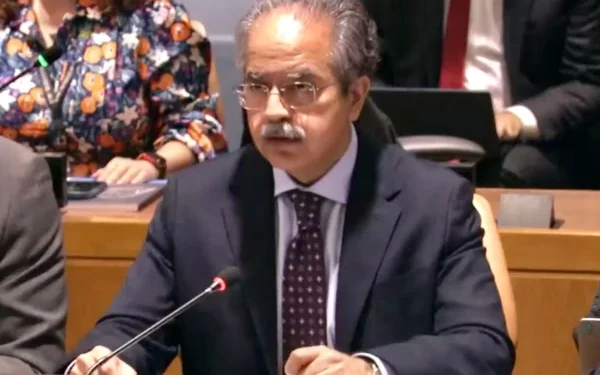Introduction: Pakistan Raises Alarm on Global Rise of Hate Speech
In an impassioned address delivered at the United Nations, Pakistan has sounded a serious warning to the international community about the rising threat of hate speech, misinformation, and violent extremism. Speaking on the occasion of the “International Day Against Hate Speech,” Pakistan’s Permanent Representative to the United Nations, Ambassador Asim Iftikhar Ahmed, highlighted how these phenomena have been increasingly weaponized against religious minorities, with Muslims bearing the brunt of such hostilities worldwide.
A Growing Global Menace: The Dangerous Spread of Hate Speech
Ambassador Asim emphasized that hate speech is no longer limited to fringe groups but is becoming institutionalized in political and media spheres. He warned that unchecked hate-driven rhetoric could further polarize societies, fuel intolerance, and destabilize international peace and security. “If these hateful narratives are not stopped, they can divide societies and pose a threat to global peace and stability,” he asserted.
The diplomat noted the worrying emergence of discriminatory laws, particularly in some parts of the world, that enable or encourage religious persecution. He pointed to recent incidents where Muslim religious symbols have been desecrated or mocked under the guise of free speech, thereby promoting a hostile environment for Muslims globally.
The Rise of Islamophobia: A Systematic Pattern of Discrimination
Islamophobia was a central theme in Pakistan’s national statement. Ambassador Asim described it as a growing and disturbing trend that is manifesting in multiple forms: discriminatory legislation, media vilification, and physical violence. He criticized the systemic defamation of Islam and the frequent use of negative stereotypes about Muslims that have become entrenched in political discourse, particularly in some Western societies.
He emphasized that these actions are not isolated incidents but part of a broader, more coordinated campaign to marginalize Muslim communities. “The recent rise in Islamophobia, expressed in discriminatory laws and systematic defamation, is extremely troubling,” he said.
Media and Political Influence: Spreading the Culture of Hate
Ambassador Asim singled out certain media platforms for their role in spreading hate and division. He argued that these platforms, influenced by powerful political forces, often promote sensationalist narratives that thrive on misinformation and foster public animosity against minority groups.
Digital media, particularly social media platforms, were also highlighted as significant contributors to the spread of hateful ideologies. “Algorithms reward sensationalism and target people based on their identity and background,” the ambassador said, highlighting the structural issues within digital platforms that perpetuate echo chambers of hate.
The Role of Digital Platforms in Amplifying Hate Speech
The Pakistani envoy made a strong case for regulating online spaces that have become breeding grounds for extremist ideologies. He underscored the need for international cooperation in addressing this digital challenge, pointing out that hate speech spreads faster and has a wider reach in the digital age.
He cautioned that when media is misused for political purposes, objective truth is sacrificed, and facts are often distorted to suit political agendas. The impact is not only local but reverberates globally, especially in diaspora communities that become targets of xenophobia and racism due to these media narratives.
Urgent Call for Implementation of UN Hate Speech Strategy
Pakistan has reiterated its call for the full and effective implementation of the “United Nations Strategy and Action Plan on Combating Hate Speech.” This comprehensive framework, which aims to counter all forms of discrimination and hatred—religious, racial, gender-based, or nationalistic—must be actively pursued by all member states.
“Addressing all forms of hatred is key to global cohesion,” the ambassador stressed. He urged the international community to recognize hate speech not just as a moral failing, but as a direct threat to peace and security.
Welcoming the UN Special Envoy on Islamophobia
A significant part of Pakistan’s diplomatic push at the UN has been the recognition of Islamophobia as a distinct and rising concern. Ambassador Asim expressed appreciation for the appointment of a Special Envoy by the United Nations to monitor and combat Islamophobia—an initiative approved under the Organization of Islamic Cooperation (OIC) resolution 78/264.
The envoy will be tasked with reporting incidents of anti-Muslim bigotry and advising on policies to counter such discrimination. Ambassador Asim called this appointment a “timely and institutional step” and reaffirmed Pakistan’s full support for the mandate.
A Broader Vision: Combating All Forms of Hate and Intolerance
While Pakistan focused on Islamophobia, the ambassador made it clear that the fight against hate must be all-encompassing. Racism, xenophobia, antisemitism, misogyny, and homophobia are other pressing forms of discrimination that also need immediate attention.
The ambassador called on all nations to uphold the values of equality, tolerance, and human dignity, warning that selective action against hate undermines the very principles of the United Nations Charter. He stressed that combating hate speech must be part of a broader global effort to build inclusive, peaceful, and resilient societies.
Conclusion: A United Front Against Hate Speech
Pakistan’s message to the United Nations is both a warning and a call to action. The rapid rise in hate speech, particularly through digital platforms and politically motivated media, is threatening social cohesion and international peace. By advocating for a comprehensive global strategy to tackle this growing threat, Pakistan aims to lead efforts that promote tolerance, interfaith harmony, and respect for all cultures and religions.
Ambassador Asim’s speech underscores the need for global unity and institutional resolve. Whether through enforcing UN strategies, supporting special envoys, or regulating digital platforms, the fight against hate speech must be relentless and inclusive.
As the world becomes more interconnected, the collective responsibility to protect human dignity, reject hatred, and promote peace becomes even more urgent.

























